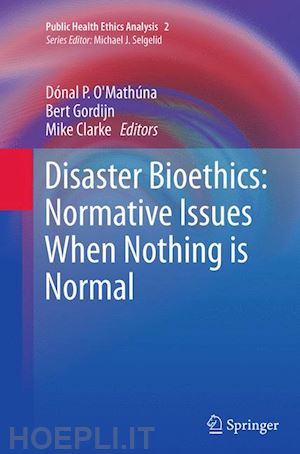
Questo prodotto usufruisce delle SPEDIZIONI GRATIS
selezionando l'opzione Corriere Veloce in fase di ordine.
Pagabile anche con Carta della cultura giovani e del merito, 18App Bonus Cultura e Carta del Docente
This book provides an early exploration of the new field of disaster bioethics:
examining the ethical issues raised by disasters. Healthcare ethics issues are addressed in the first part of this book. Large-scale casualties lead to decisions about who to treat and who to leave behind, cultural challenges, and communication ethics. The second part focuses on disaster research ethics.
With the growing awareness of the need for evidence to guide disaster preparedness and response, more research is being conducted in disasters. Any research involving humans raises ethical questions and requires appropriate regulation and oversight. The authors explore how disaster research can take account of survivors? vulnerability, informed consent, the sudden onset of disasters, and other ethical issues. Both parts examine ethical challenges where seeking to do good, harm can be done. Faced with overwhelming needs and scarce resources, no good solution may be apparent. But choosing the less wrong option can have a high price. In addition, what might seem right at home may not be seen to be right elsewhere. This book provides in-depth and practical reflection on these and other challenging ethical questions arising during disasters.
Scholars and practitioners who gathered at the Brocher Foundation in Geneva, Switzerland in 2011 offer their reflections to promote further dialogue so that those devastated by disasters are respected by being treated in the most ethically soun
d ways possible.
Chapter 1 Disaster Bioethics: An Introduction.- Chapter 2 Macro-triage in Disaster Planning.- Chapter 3 Ethics and Emergency Disaster Response. Normative Approaches and Training Needs for Humanitarian Health Care Providers.- Chapter 4 Triage in Disaster Medicine: Ethical Strategies in Various Scenarios Chapter 5 When Relief Comes from a Different Culture: Sri Lanka’s Experience of the Asian Tsunami References.- Chapter 6 Ethical Issues in Health Communications: Strategies for the (Inevitable) Next Pandemic.- Chapter 7 Evidence and Healthcare needs during Disasters.- Part II.- Chapter 8 Interests Divided: Risks to Disaster Research Subjects vs. Benefits to Future Disaster Victims.- Chapter 9 Purple Dinosaurs and Victim Consent to Research in Disasters.- Chapter 10 Setting Disaster Research Priorities. - Chapter 11 Studying Vulnerable Populations in the Context of Enhanced Vulnerability.- Chapter 12 Research Ethics Governance in Disaster Situations.- Chapter 13 Ethical Concerns in Disaster Research – A South African Perspective.- References.- Appendix I - Code of Conduct for the International Red Cross and Red Crescent Movement and NGOs in Disaster Relief.- Appendix II - WMA Statement on Medical Ethics in the Event of Disasters.- Index











Il sito utilizza cookie ed altri strumenti di tracciamento che raccolgono informazioni dal dispositivo dell’utente. Oltre ai cookie tecnici ed analitici aggregati, strettamente necessari per il funzionamento di questo sito web, previo consenso dell’utente possono essere installati cookie di profilazione e marketing e cookie dei social media. Cliccando su “Accetto tutti i cookie” saranno attivate tutte le categorie di cookie. Per accettare solo deterninate categorie di cookie, cliccare invece su “Impostazioni cookie”. Chiudendo il banner o continuando a navigare saranno installati solo cookie tecnici. Per maggiori dettagli, consultare la Cookie Policy.